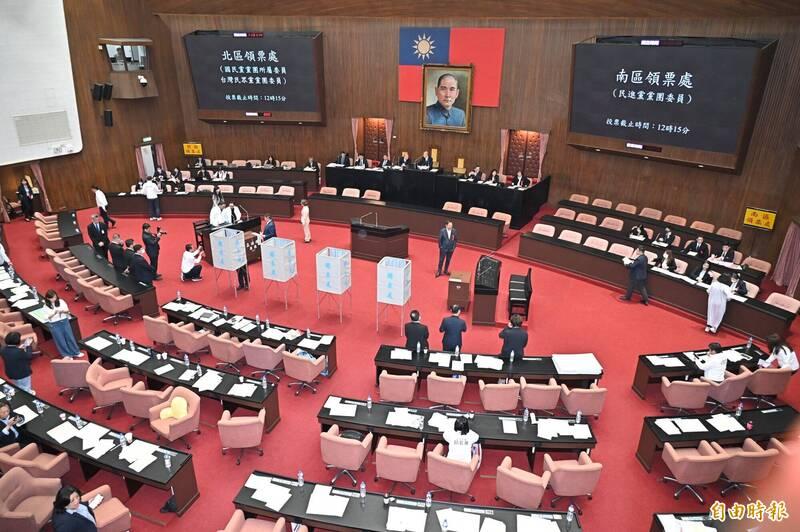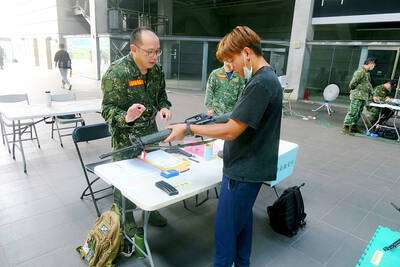The Legislative Yuan today rejected the Executive Yuan’s request to reconsider an amendment to the Police Personnel Management Act (警察人員人事條例) by a vote of 62 to 50.
The amendment states that the monthly income replacement ratio for police, firefighters, coast guard personnel, National Immigration Agency officers and airborne service personnel should be set at 43.25 percent for those who have served for 15 years, with the ratio going up by 1.75 percentage points per year until they reach 80 percent for those with 36 years of service.
The Chinese Nationalist Party (KMT) and Taiwan People’s Party (TPP) caucuses both voted against the reconsideration with 62 votes, outnumbering 50 votes in favor from the Democratic Progressive Party (DPP) caucus.

Photo: Tu Chien-jung, Taipei Times
DPP caucus whip Ker Chien-ming (柯建銘) was absent from the voting.
Premier Cho Jung-tai (卓榮泰) said on April 1 that the amendment has five major issues, including impacting the pension fund’s finances.
The amendment significantly increases government expenditure without consulting the Executive Yuan or specifying the source of additional funds, Cho said.
In addition, it undermines the fairness of the pension system, violating principles of equality and generational justice, he said.
It also affects the rights and interests of current and retired government employees, he added.
While immigration and aviation personnel were included, relevant regulations were not updated accordingly, Cho said.
As such, Cho requested a reconsideration by the Legislative Yuan with the approval of President William Lai (賴清德).
This marks the sixth executive reconsideration request rejected by the legislature in the current legislative session, including requests to reconsider amendments to the Constitutional Court Procedure Act (憲法訴訟法), Public Officials Election and Recall Act (公職人員選舉罷免法), Act Governing the Allocation of Government Revenues and Expenditures (財政收支劃分法) and central government budget.
According to the constitution, if the Executive Yuan deems legislation passed by the Legislative Yuan to be difficult to implement, it may, with the President’s approval, request the legislature to reconsider the legislation within 10 days of receiving it.
The Legislative Yuan must make a decision on the reconsideration within 15 days of receiving the request.
If no decision is made within this period, the original legislation becomes void.
If more than half of the Legislative Yuan, or 57 lawmakers, vote to maintain the original bill, then the Executive Yuan must accept the resolution.
The Executive Yuan, the Examination Yuan and the DPP caucus would cautiously evaluate the situation and seek remedies according to constitutional procedures, DPP caucus chief executive Rosalia Wu (吳思瑤) said.
The DPP is not surprised that the bill was rejected, Wu said, adding that more reform bills regarding the monthly income replacement ratio for civil servants and teachers would come very soon.
The KMT is taking the “backward path” to please their voters, Wu said.
The DPP also condemned the TPP for exploiting the younger generation and trampling on generational justice, she said.
Cabinet spokesperson Michelle Lee (李慧芝) today said it is regrettable that the legislature did not invite Cho to elaborate on the bill before rejecting it.
It is the third time that the legislature has broken the normal practice of a constitutional government, Lee said.
The Executive Yuan said it reached a consensus last year with both the ruling party and the opposition parties that the legislature should first consult the cabinet before passing any bills that would massively increase the government’s budget for the fiscal year.
The amendments would increase the central government’s financial burden, Lee said, and yet the legislature did not discuss with the Executive Yuan.
The Executive Yuan is to consult experts and scholars before taking the next step, Lee said.
Additional reporting by CNA and Fion Khan

A magnitude 6.4 earthquake struck off the coast of Hualien County in eastern Taiwan at 7pm yesterday, the Central Weather Administration (CWA) said. The epicenter of the temblor was at sea, about 69.9km south of Hualien County Hall, at a depth of 30.9km, it said. There were no immediate reports of damage resulting from the quake. The earthquake’s intensity, which gauges the actual effect of a temblor, was highest in Taitung County’s Changbin Township (長濱), where it measured 5 on Taiwan’s seven-tier intensity scale. The quake also measured an intensity of 4 in Hualien, Nantou, Chiayi, Yunlin, Changhua and Miaoli counties, as well as

Credit departments of farmers’ and fishers’ associations blocked a total of more than NT$180 million (US$6.01 million) from being lost to scams last year, National Police Agency (NPA) data showed. The Agricultural Finance Agency (AFA) said last week that staff of farmers’ and fishers’ associations’ credit departments are required to implement fraud prevention measures when they serve clients at the counter. They would ask clients about personal financial management activities whenever they suspect there might be a fraud situation, and would immediately report the incident to local authorities, which would send police officers to the site to help, it said. NPA data showed

ENERGY RESILIENCE: Although Alaska is open for investments, Taiwan is sourcing its gas from the Middle East, and the sea routes carry risks, Ho Cheng-hui said US government officials’ high-profile reception of a Taiwanese representative at the Alaska Sustainable Energy Conference indicated the emergence of an Indo-Pacific energy resilience alliance, an academic said. Presidential Office Secretary-General Pan Men-an (潘孟安) attended the conference in Alaska on Thursday last week at the invitation of the US government. Pan visited oil and gas facilities with senior US officials, including US Secretary of the Interior Doug Burgum, US Secretary of Energy Chris Wright, Alaska Governor Mike Dunleavy and US Senator Daniel Sullivan. Pan attending the conference on behalf of President William Lai (賴清德) shows a significant elevation in diplomatic representation,

The Taipei City Reserve Command yesterday initiated its first-ever 14-day recall of some of the city’s civilian service reservists, who are to undergo additional training on top of refresher courses. The command said that it rented sites in Neihu District (內湖), including the Taipei Tennis Center, for the duration of the camp to optimize tactical positioning and accommodate the size of the battalion of reservists. A battalion is made up of four companies of more than 200 reservists each, it said. Aside from shooting drills at a range in New Taipei City’s Linkou District (林口), the remainder of the training would be at